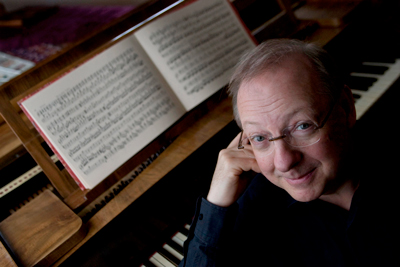by Mike Telin

On Sunday, August 7 at 7:00 pm, Nicholas McGegan will return to Blossom Music Center to lead The Cleveland Orchestra in a concert that will feature music by his two preferred dinner guests: Joseph Haydn (Symphony No. 99) and Felix Mendelssohn (Symphony No. 3). The evening will also include George Benjamin’s Divertimento on Themes by Gluck with the Orchestra’s assistant principal oboe, Jeffrey Rathbun, as soloist.
McGegan, who admitted to be being a little bit of a foodie — he was putting vegetable soup on to simmer when I phoned — said that he looks forward to returning to Blossom. “I love conducting any Mendelssohn or Haydn symphony, and I’m just thrilled to be doing them with the wonderful Cleveland Orchestra at such a lovely place. I’ll be in seventh heaven.”
Although Haydn and Mendelssohn are household names, the prolific Australian composer Arthur Benjamin has never achieved the same recognition. “I knew about Arthur Benjamin but I didn’t know much about his music, although I have played various pieces of his,” McGegan said.
During Benjamin’s life, many of the greatest musicians played and recorded his works. One example is his Romantic Fantasy for Violin, Viola and Orchestra, which was first recorded by Jascha Heifetz and William Primrose. From 1941 until 1946 he served as conductor of the CBC Symphony Orchestra, during which time he became a major musical figure in Canada. A frequent visitor to the United States to champion the cause of contemporary British music, he also served on the faculty at Reed College. Today his best-known composition is Jamaican Rumba, a work for which the Jamaican government rewarded him with free barrels of rum.
“He was a much more interesting composer — and person — than his somewhat staid name,” McGegan pointed out. “Usually people called Arthur are so dependable. They have walrus mustaches, drink beer, and are retired. But he was a fascinating guy and the music of his that I know is delightful.”
McGegan is certain that the audience will enjoy Benjamin’s Divertimento on Themes by Gluck. “We’ve come across Gluck before with the “Dance of the Blessed Spirits” from Orfeo, but the Divertimento is actually based on violin music.” The conductor pointed out that the work is written in a style similar to what Vaughan Williams used for his Fantasia on a Theme of Tallis. “It’s taking music from the past and sort of dressing it up — orchestrating it and changing it, like Britten did with various pieces. It’s a fine tradition, and when I got the score I realized that it is a lovely piece.”
McGegan looks forward to being back in Cleveland and getting to work with Jeffrey Rathbun. “He’s a terrific oboist and it’s going to be a treat to perform it with him. I love having soloists from within the orchestra. Pretty much any person in an orchestra as great as The Cleveland Orchestra could be a soloist. Last year Mark Kosower performed the Haydn C-major cello concerto, and frankly that was about the best I had ever heard it played. It was stunning. And when Peter Otto performed the Four Seasons, he played it brilliantly. You don’t always have to fly in a soloist to guarantee a great performance, especially when you’ve got really great people in your midst. I think it’s great for the audience too, because the spotlight is suddenly on somebody they’re familiar with.”
When he’s not guest conducting orchestras around the world, Nicholas McGegan serves as music director of the San Francisco-based Philharmonia Baroque Orchestra & Chorale, a position he has now held for 30 years. As part of the celebration commemorating that milestone, McGegan and his ensemble recently released a CD of Alessandro Scarlatti’s long-forgotten La Gloria di Primavera (“The Glory of Spring”).
“The recording came about because the executive director of a festival I ran in Germany for 21 years did his PhD on Alessandro Scarlatti. Over the years the director brought many of Scarlatti’s works to the table, but this particular piece, The Glory of Spring, is one he had raved about for a long time. Back in 2010 he was already saying that the 2015-16 season was going to be the 300th anniversary of the work. It’s a very colorful piece that’s incredibly lavish, especially when the main character, Spring, sings the most heartfelt aria with two solo cellos. It’s just the richest sound — a real heart stopper.”
McGegan and Philharmonia Baroque recorded the work live in October of 2015 and performed it at Carnegie Hall this past May, and they’ll take it to Tanglewood later this month. “It’s already had more performances than it ever had at the time it was written. We’ve done about six now and it only ever had two back in the day. Mr. Scarlatti is not going to be recorded as much as Handel, but with this recording at least you can hear why people thought so highly of him during his lifetime.”
Released in April, the recording was recently made Editor’s Choice in Gramophone, and the Blu-ray audio edition will be released on August 11.
Published on ClevelandClassical.com August 2, 2016.
Click here for a printable copy of this article


